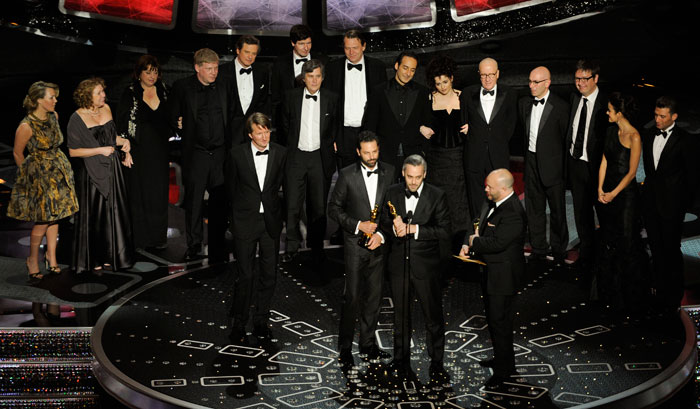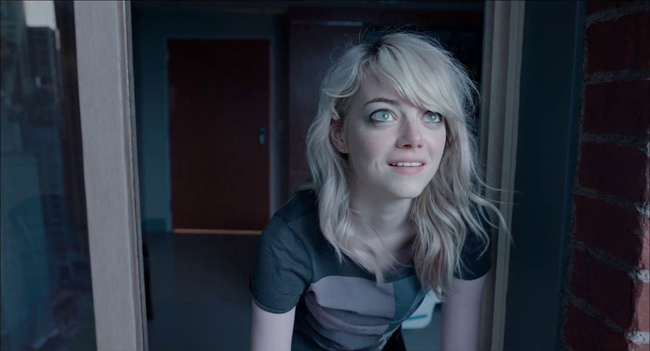I will leave the discussion of what/who won/didn’t win and why/why not to others. I have only one concern: Did it work?
For the now befuddled, let me recap what I laid out back in January when the 2011 Academy Award nominations were announced:
A year earlier, the Academy of Motion Pictures Arts and Sciences had expanded the Best Picture category from five to 10 nominations. Their aim was twofold:
To make room at the Best Picture table for releases from the major studios who had been being elbowed out for some years by independent releases. In doing so, the hope was that —- including presumably more widely popular major releases into the Best Picture race might juice the Oscar ceremonies’ anemic viewership which had been sagging for about as long as art house indies had been walking home with The Big Prize.The Hurt Locker
The expanded 2010 Best Picture category wasn’t quite the penicillin the Academy had been hoping for. Instead of giving the majors a chance to show off how good they were, the newly broadened  category looked more like an indie mugging: seven of the 10 Best Picture nominees that year were indies, and, ultimately, it was an indie – The Hurt Locker – that took the crown, beating out – among others — all-time biggest-earner ever, Avatar.
category looked more like an indie mugging: seven of the 10 Best Picture nominees that year were indies, and, ultimately, it was an indie – The Hurt Locker – that took the crown, beating out – among others — all-time biggest-earner ever, Avatar.
If you went beyond Best Picture, the majors looked even shabbier. Out of the 35 nominations spread across the seven major creative categories – Director, Actor, Actress, Supporting Actor/Actress, Adapted/Original Screenplay – the majors copped only 13 and took home the trophy in just one (Sandra Bullock’s Best Actress win for The Blind Side).
As for the ratings, well, anything would have been an improvement over 2009 when art house champ Slumdog Millionaire’s Best Picture win was watched by a skimpy (in Oscar terms) 37 million viewers.In 2010, the inclusion of Avatar (supported by another hit: feel-gooder The Blind Side) managed to drag the numbers up to almost 42 million. An improvement, sure, but still below the 43-47 million range that had marked most of the 1990s not counting a huge spike of over 57 million in 1998 when Titanic won Best Picture.
So: did it work any better this year?
Not so much.
In terms of nominations, the majors still made a poor showing. Again, seven of the 10 Best Picture nominees were indies, and indies occupied 25 of the 35 slots in the seven major creative categories. And when it came time to hand out the little gold men, yet again it was an indie show.
The majors scored only one win with Aaron Sorkin’s Best Adapted Screenplay Oscar for The Social Network. Beyond that, it was an indie rout: as expected, Natalie Portman walked away with Best Actress for Black Swan; The Fighter took both supporting performance Oscars (Christian Bale; Melissa Leo); and everything else was glommed up by The King’s Speech.
It wasa spectacular return to form for the one-time Oscar hogs the Weinstein brothers who had seemed to stumble – and keep stumbling — after leaving Miramax in 2005. But with The King’s Speech, they pulled off the industry hat trick, delivering a critically-respected, fat commercial hit ($105 million domestic and still counting against a budget of $15 million), and a mantle’s worth of Oscars for Best Picture, Director (Tom Hooper), Original Screenplay (David Seidler), and Actor (Colin Firth).
The majors, on the other hand, swept the technical awards: Inception won for – unsurprisingly – Visual Effects, Cinematography, and Sound Mixing; Alice in Wonderland took Oscars for Costume Design and Art Direction; and The Social Network walked off with Editing and Original Score.
If you wanted to make a very broad generalization based on the distribution of awards, you might be inclined to say nobody can put on an eye-dazzling spectacle like the Big Boys; but nobody can tell a story like the Little Guys.
 As for viewership, it did what Oscar viewership usually does when the indies rule the day: they nosedived. The ceremonies were anchored by Anne Hathaway and James Franco; the youngest hosts in the history of the awards and a blatant attempt at trying to (as the marketing guys like to say) “bring the kids in.” They didn’t. Primetime numbers for the Sunday night telecast were 37.6 million: the third worst Oscar telecast performance in the last quarter of a century.
As for viewership, it did what Oscar viewership usually does when the indies rule the day: they nosedived. The ceremonies were anchored by Anne Hathaway and James Franco; the youngest hosts in the history of the awards and a blatant attempt at trying to (as the marketing guys like to say) “bring the kids in.” They didn’t. Primetime numbers for the Sunday night telecast were 37.6 million: the third worst Oscar telecast performance in the last quarter of a century.
So, what does it all mean? Well, now that’s a question.
What any of this portends for future Oscar telecasts is secondary (sorry, Academy – it’s not always all about you). Even if things go worst case, the world will not necessarily mourn the loss of the glitziest, most ponderous, most self-congratulatory night in all of entertainment (particularly when so many of the biggest players had so little to be self-congratulatory about). As the viewership numbers show, plenty of people were quite happy to watch The Simpsons instead.
But the Oscars are the canary in the coal mine. What’s happening with the awards – and has been happening over the last decade or so — signifies something bigger; an apparent industry reconfiguration marked by an ever more hard to shake cinematic apartheid where the wall between dazzle and substance seems to be growing higher and harder to breach.
– Bill Mesce






